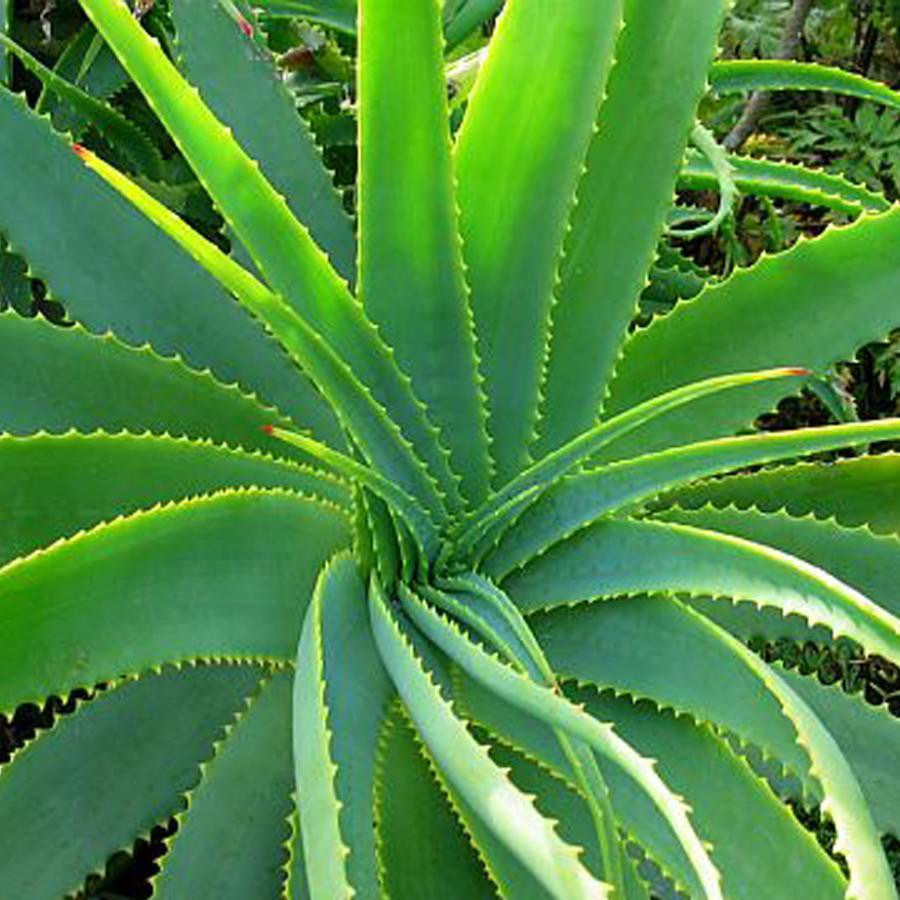Shop Sadhguru Books from Abebooks

Aloe vera has been one of the most important plants used in folk
medicine. The Egyptians referred to aloe as the "plant of immortality"
and included it among the funerary gifts buried with the pharaohs. The
healing benefits of aloe were recognized in the ancient Indian, Chinese,
Greek, and Roman civilizations. It is traditionally used to heal
wounds, relieve itching and swelling, and is known for its
anti-inflammatory and antibacterial properties.
Aloe vera, or ghrita kumara in Sanskrit, is a member of the
lily family and is very cactus-like in its characteristics. It is one to
two feet tall, and its leaves are succulent — broad at the base and
pointed at the tips, with spines along the edges. These fat leaves
contain the clear healing gel that is 96% water. The other four percent
contains 75 known substances including Vitamins A, B, C, and E; calcium;
amino acids for protein building; and enzymes used in the digestive
system.
There are over 240 species of aloe. However, only three or four of
them have medicinal properties. The most potent one is aloe barbadensis.
Native to North Africa and Spain, this plant now also grows in the hot
dry regions of Asia, Europe and America.
External Applications
The healing effect of aloe results from its ability to prevent injury
to epithelial tissues, and promote healing of injured tissues. An
epithelium is a layer of cells that covers the body. Our largest
epithelium is the skin, and one of the main applications of aloe vera is
to soothe a variety of skin ailments such as mild cuts, insect stings,
bruises, poison ivy and eczema. It also has antibacterial and antifungal
qualities, and increases blood flow to wounded areas. In addition, aloe
vera stimulates fibroblasts, the skin cells responsible for wound
healing and the manufacture of collagen, the protein that controls the
aging process of the skin and wrinkling. The skin absorbs aloe vera up
to four times faster than water; it appears to help the pores of the
skin open and receive the moisture and nutrients of the plant.
Due to its soothing and cooling qualities, Maharishi Ayurveda recommends aloe vera for a number of skin conditions:
- Light burns and wounds: Cut off an aloe leaf and apply the gel several times a day.
- Mild sunburn: Mix 70% aloe vera gel and 30% bentonite clay. Apply paste on affected areas and wash it off after 15 minutes.
(It is advisable to consult a health professional in the event of any injury.)
Internal Applications
In addition to the skin, other epitheliums in our body include the
lining of the gut, the bronchial tubes and the genital tract, which also
benefit from the healing effect of aloe vera. When taken internally,
aloe vera juice aids the digestion and absorption of nutrients, helps
control blood sugar, increases energy production, promotes
cardiovascular health, improves liver function, and boosts the immune
system.
- For balancing digestion and elimination: Take 1 tablespoon aloe vera gel in the morning on an empty stomach. Aloe helps clear the toxins out of the digestive system, facilitates digestion and improves the functioning of the kidneys, liver and gall bladder. The anti-inflammatory fatty acids in aloe alkalize the digestive juices and prevent acidity — a common cause of indigestion. These fatty acids benefit not only the stomach but the small intestine and the colon as well.
- Skin problems: Since aloe vera purifies the body and aids liver function, it is beneficial for the skin when taken internally. Take 1-2 teaspoons fresh aloe gel daily for young and healthy skin.
Note: Pregnant women and children under five should not take aloe vera internally.
https://www.mapi.com/ayurvedic-knowledge/plants-spices-and-oils/aloe-vera-the-miracle-plant.html
You can get Aloevera tablets from iHerb https://fas.st/hZUZj
You can get Aloevera tablets from iHerb https://fas.st/hZUZj
😎👍👌👏
ReplyDeleteThanks
Delete